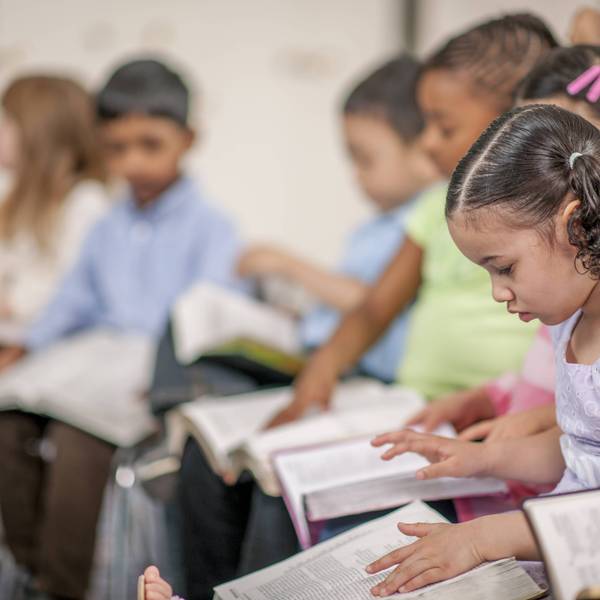
Texas Attorney General Ken Paxton speaks during the annual Conservative Political Action Conference (CPAC) meeting on February 23, 2024, in National Harbor, Maryland.
Texas AG Demands Schools Display Ten Commandments Even After Judge's Injunction
"The Constitution, not the Ten Commandments, built this country," said the Freedom from Religion Foundation in response to Paxton.
Texas Attorney General Ken Paxton on Monday said that the vast majority of schools in the Lone Star State should still plan on displaying the Ten Commandments in classrooms even after a federal judge ruled against it last week.
In a statement, Paxton said that "schools not enjoined by ongoing litigation must abide" by a state law that requires the display of the Ten Commandments in all public and secondary school classrooms.
"The woke radicals seeking to erase our nation's history will be defeated," he said. "I will not back down from defending the virtues and values that built this country."
Paxton asserted that only nine Texas school districts are affected by the injunction and said that all other districts "must abide by the law once it takes effect on September 1, 2025."
The Texas attorney general's defiant stance on the Ten Commandments earned him a quick rebuke from Rep. Joaquin Castro (D-Texas), who accused him of grandstanding instead of doing his job as the state's chief law enforcement official.
"Paxton's job is to uphold the Constitution, which guarantees the separation of church and state—not the Ten Commandments," he wrote on X. "Our public schools should focus on educating Texas students, not stoking culture wars."
The Freedom From Religion Foundation also rebuked Paxton for failing to uphold the Constitution's prohibition of the government establishment of a religion.
"The Constitution, not the Ten Commandments, built this country," the foundation said. "Forcing students to observe one religion’s rules is a blatant violation of the First Amendment regardless of what Ken Paxton claims. Public schools are for education, not religious indoctrination."
Paxton's declaration came less than a week after US District Judge Fred Biery of the United States District Court for the Western District of Texas issued a preliminary injunction against the state law requiring the Ten Commandments to be displayed.
In his ruling, Biery argued that the classroom displays "are likely to pressure the [students] into religious observance, meditation on, veneration, and adoption of the state's favored religious scripture, and into suppressing expression of their own religious or nonreligious background and beliefs while at school."
An Urgent Message From Our Co-Founder
Dear Common Dreams reader, The U.S. is on a fast track to authoritarianism like nothing I've ever seen. Meanwhile, corporate news outlets are utterly capitulating to Trump, twisting their coverage to avoid drawing his ire while lining up to stuff cash in his pockets. That's why I believe that Common Dreams is doing the best and most consequential reporting that we've ever done. Our small but mighty team is a progressive reporting powerhouse, covering the news every day that the corporate media never will. Our mission has always been simple: To inform. To inspire. And to ignite change for the common good. Now here's the key piece that I want all our readers to understand: None of this would be possible without your financial support. That's not just some fundraising cliche. It's the absolute and literal truth. We don't accept corporate advertising and never will. We don't have a paywall because we don't think people should be blocked from critical news based on their ability to pay. Everything we do is funded by the donations of readers like you. Will you donate now to help power the nonprofit, independent reporting of Common Dreams? Thank you for being a vital member of our community. Together, we can keep independent journalism alive when it’s needed most. - Craig Brown, Co-founder |
Texas Attorney General Ken Paxton on Monday said that the vast majority of schools in the Lone Star State should still plan on displaying the Ten Commandments in classrooms even after a federal judge ruled against it last week.
In a statement, Paxton said that "schools not enjoined by ongoing litigation must abide" by a state law that requires the display of the Ten Commandments in all public and secondary school classrooms.
"The woke radicals seeking to erase our nation's history will be defeated," he said. "I will not back down from defending the virtues and values that built this country."
Paxton asserted that only nine Texas school districts are affected by the injunction and said that all other districts "must abide by the law once it takes effect on September 1, 2025."
The Texas attorney general's defiant stance on the Ten Commandments earned him a quick rebuke from Rep. Joaquin Castro (D-Texas), who accused him of grandstanding instead of doing his job as the state's chief law enforcement official.
"Paxton's job is to uphold the Constitution, which guarantees the separation of church and state—not the Ten Commandments," he wrote on X. "Our public schools should focus on educating Texas students, not stoking culture wars."
The Freedom From Religion Foundation also rebuked Paxton for failing to uphold the Constitution's prohibition of the government establishment of a religion.
"The Constitution, not the Ten Commandments, built this country," the foundation said. "Forcing students to observe one religion’s rules is a blatant violation of the First Amendment regardless of what Ken Paxton claims. Public schools are for education, not religious indoctrination."
Paxton's declaration came less than a week after US District Judge Fred Biery of the United States District Court for the Western District of Texas issued a preliminary injunction against the state law requiring the Ten Commandments to be displayed.
In his ruling, Biery argued that the classroom displays "are likely to pressure the [students] into religious observance, meditation on, veneration, and adoption of the state's favored religious scripture, and into suppressing expression of their own religious or nonreligious background and beliefs while at school."
- Federal Court Blocks Texas Law Requiring Ten Commandments in Every Public School Classroom ›
- 'Educating, Not Evangelizing': Court Rules Against Texas Ten-Commandments-In-Every-Classroom Law ›
- Arkansas Faith Leaders Urge Lawmakers to Reject Bill Forcing Schools to Display Ten Commandments ›
- Texas Families Sue to Stop Display of Ten Commandments in Public Schools | Common Dreams ›
Texas Attorney General Ken Paxton on Monday said that the vast majority of schools in the Lone Star State should still plan on displaying the Ten Commandments in classrooms even after a federal judge ruled against it last week.
In a statement, Paxton said that "schools not enjoined by ongoing litigation must abide" by a state law that requires the display of the Ten Commandments in all public and secondary school classrooms.
"The woke radicals seeking to erase our nation's history will be defeated," he said. "I will not back down from defending the virtues and values that built this country."
Paxton asserted that only nine Texas school districts are affected by the injunction and said that all other districts "must abide by the law once it takes effect on September 1, 2025."
The Texas attorney general's defiant stance on the Ten Commandments earned him a quick rebuke from Rep. Joaquin Castro (D-Texas), who accused him of grandstanding instead of doing his job as the state's chief law enforcement official.
"Paxton's job is to uphold the Constitution, which guarantees the separation of church and state—not the Ten Commandments," he wrote on X. "Our public schools should focus on educating Texas students, not stoking culture wars."
The Freedom From Religion Foundation also rebuked Paxton for failing to uphold the Constitution's prohibition of the government establishment of a religion.
"The Constitution, not the Ten Commandments, built this country," the foundation said. "Forcing students to observe one religion’s rules is a blatant violation of the First Amendment regardless of what Ken Paxton claims. Public schools are for education, not religious indoctrination."
Paxton's declaration came less than a week after US District Judge Fred Biery of the United States District Court for the Western District of Texas issued a preliminary injunction against the state law requiring the Ten Commandments to be displayed.
In his ruling, Biery argued that the classroom displays "are likely to pressure the [students] into religious observance, meditation on, veneration, and adoption of the state's favored religious scripture, and into suppressing expression of their own religious or nonreligious background and beliefs while at school."
- Federal Court Blocks Texas Law Requiring Ten Commandments in Every Public School Classroom ›
- 'Educating, Not Evangelizing': Court Rules Against Texas Ten-Commandments-In-Every-Classroom Law ›
- Arkansas Faith Leaders Urge Lawmakers to Reject Bill Forcing Schools to Display Ten Commandments ›
- Texas Families Sue to Stop Display of Ten Commandments in Public Schools | Common Dreams ›

